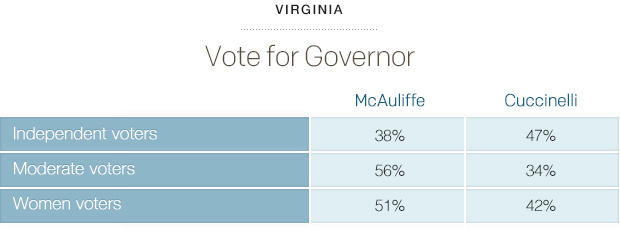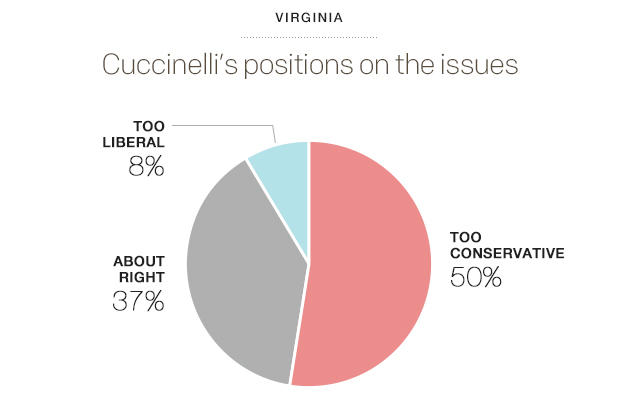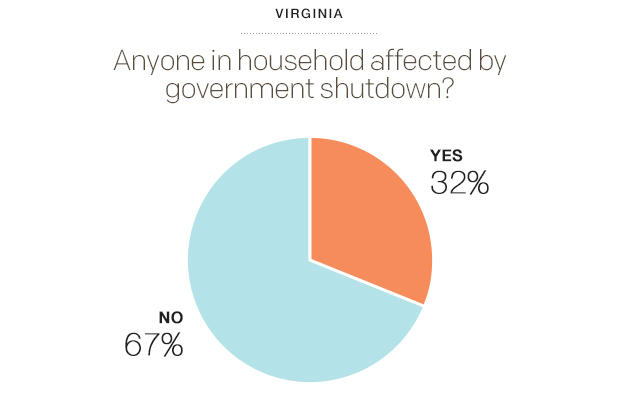McAuliffe wins nailbiter Virginia governor's race
By Fred Backus, Sarah Dutton and Rebecca Kaplan
Updated 11/6 at 8:15 a.m. ET
A bitter, divisive race between Democrat Terry McAuliffe and Republican Attorney General Ken Cuccinelli is over and it turned out to be a nailbiter. McAuliffe defeated Cuccinelli in a surprisingly slim 48-45 percent victory to become Virginia's next governor, breaking a long Virginia tradition going back to 1977 of voting for a governor from the opposing party of the sitting president.
Virginia was one of two states choosing governors Tuesday, along with New Jersey - where Gov. Chris Christie, R-N.J., was re-elected - and a slew of local elections also took place across the country including elections for big-city mayors and various state ballot initiatives.
According to exit polls, both McAuliffe and Cuccinelli did very well among their own partisans - each getting more than nine in 10 votes from members of their own parties. Cuccinelli had a nine-point edge among independents, who make up three in 10 voters in Virginia. But McAuliffe did better than Cuccinelli in getting out his base: slightly more voters described themselves as Democrats (37 percent) than Republicans (32 percent).
McAuliffe also won among voters under 45 and college graduates - both groups that McDonnell won four years ago - and he led among moderates (22 points) and women (9 points).
Virginia voters may have seen Cuccinelli as more extreme ideologically than McAuliffe. Fifty percent saw Cuccinelli as too conservative, compared to just 41 percent who saw McAuliffe as too liberal.
There are important changes to the demographic turnout from four years ago that made the race close this year. The conservative vote was down slightly - from 40 percent in 2009 to 36 percent today - and they were slightly less supportive of the Republican candidate. White evangelicals - who voted strongly Republican Tuesday and four years ago - made up 27 percent of the vote, down from 34 percent in 2009. A majority of white voters - 56 percent - favored Cuccinelli in the race, but their percentage of the electorate was down slightly (72 percent now compared to 78 percent in 2009), while the percentage of black voters - who vote overwhelmingly Democratic - has rose (20 percent now compared to 16 percent in 2009).
Regionally, while Cuccinelli won (58 percent) in the more conservative and rural western and central regions of Virginia, McAuliffe had the edge in the swing district of Richmond and the lower Potomac River (47-43 percent) and held a majority (54 percent) in the Tidewater region of Norfolk and Virginia Beach - which voted for Obama last year but went Republican four years ago in the race for governor. In the heavily Democratic D.C. suburbs, McAuliffe outperformed Cuccinelli by almost two-to-one.
How voters perceived the recent partisan battles in Washington give some indication of their voting preference today. Forty-six percent of voters support the 2010 health care law while 53 percent opposed it: nine in 10 who support the law voted for McAuliffe, while slightly fewer who oppose it - eight in 10 - voted for Cuccinelli. The recent shutdown of the federal government also looms large in this state where a sizeable percentage lives in the shadow of the nation's capital. Thirty-two percent of voters said their household has been affected by the shutdown, and while 45 percent blamed Mr. Obama more for the shutdown, 48 percent blamed the Republicans. Those who blame the president more are overwhelmingly supporting Cuccinelli, while those who blame the Republicans more are overwhelmingly voting for McAuliffe.
In the weeks leading up to the election, McAuliffe held a lead in the high single digits over Cuccinelli. The most recent Quinnipiac poll out Monday showed McAuliffe up 46 to 40 percent, a smaller margin than a survey from Oct. 23 in which he was up 46 to 39 percent but up from an Oct. 30 poll that had him up only by 4.
Cuccinelli's only hope for victory lay in the possibility that Democratic turnout was extremely low - even lower than it usually is in the off-year elections when there is no presidential race to draw voters to the polls. McAuliffe's surrogates, including President Obama, Vice President Biden and former President Clinton implored Democrats to bring out their friends and neighbors in the days leading up to the election.
The Virginia race has been a particularly vicious contest marked mostly by personal attacks flung back and forth during the course of the campaign. Cuccinelli has charged McAuliffe with running a dishonest, unserious campaign; McAuliffe has attempted to paint Cuccinelli, a tea party favorite, as a far-right extremist out to end access to abortions and contraception. Even on policy issues, the fact-checking website Politifact said that both candidates "fared miserably on the Truth-O-Meter this fall."
Things were so dismal that two of the state's major papers - the Richmond Times-Dispatch and the Roanoke Times -- declined to endorse either candidate this year for the first time in recent memory.
"The major-party candidates have earned the citizenry's derision. The third-party alternative has run a more exemplary race yet does not qualify as a suitable option. We cannot in good conscience endorse a candidate for governor," said the Times-Dispatch.
Despite the bitter nature of the campaign, Virginia was the only competitive race on the map, which meant both sides poured their resources - including a host of star surrogates -- into the state. Cuccinelli campaigned with Sens. Rand Paul, R-Ky., Marco Rubio, R-Fla., Wisconsin Gov. Scott Walker and former Republican presidential candidate Ron Paul. McAuliffe, for his part, got help from close friendsBill and Hillary Clinton and closed out the campaign with appearances from the president andvice president.
The lineup of surrogates and McAuliffe's deep network of sources he cultivated during his years as a Democratic fundraiser also helped him to pummel Cuccinelli in the money race. McAuliffe raised $34.4 million to Cuccinelli's $19.7, according to the nonpartisan Virginia Public Access Project.
The final days of the campaign have served in part as a microcosm of the battles between President Obama and the GOP. Cuccinelli and his supporters have said that Virginia is the next "battlefield" in their fight against the Affordable Care Act, and both Biden and Obama warned that Cuccinelli will adhere to the no-compromise politics that led to the recent government shutdown, which had an outsized effect on Virginia's substantial federal workforce.


